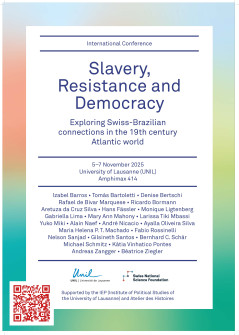At first glance, Brazil and Switzerland may seem worlds apart—one a vast, tropical nation in South America, the other a small, landlocked country in the heart of Europe. While Brazil grew into the largest economy based on slavery in the 19th century, neutral Switzerland established itself as one of the first democracies in 1848. Yet, beneath the surface, since the early modern period, both countries have been embedded in a vast web of transatlantic connections that have profoundly shaped both nations. By exploring the underlying webs of economic, political, and cultural networks and exchanges between Brazil and Switzerland, this conference seeks firstly to historicize the apparent contradiction between slavery and democracy in the 19th century and secondly explore its ongoing legacies. It brings together scholars from Brazil, Europe, and the United States who study the history of exchanges in the southern transatlantic world. The conference is part of the SNSF Eccellenza research project on “Moral and Economic Entrepreneurship: A collaborative History of Global Switzerland” directed by Bernhard C. Schär at the University of Lausanne’s Institute for Political Studies.
Wednesday 5 November 2025
17:00–19:00 — Salon Historique
How historiographies of slavery, trade and migration evolved in Switzerland and Brazil since the 1980s
Speakers:
- Béatrice Ziegler (Professor emeritus, FHNW & University of Zurich)
- Rafael de Bivar Marquese (University of São Paulo)
- Mary Ann Mahony (Central Connecticut State University)
- Maria Helena P. T. Machado (University of São Paulo)
Moderators: Bernhard C. Schär and Izabel Barros (University of Lausanne)
Welcome apéritif follows.
Thursday 6 November 2025
09:00–10:30 — Slavery, Gender, Indigenous History and Agency
Chair: Rahel Kunz
- Izabel Barros (University of Lausanne) — Beyond the Ledger: Enslaved Women’s Lives on a Swiss-Owned Plantation in 19th-century Ilhéus, Bahia
- Ayalla Oliveira Silva (Federal University of Pernambuco) — The Camacã indigenous nation and the plantation owner Fernando Steiger: agricultural frontier, labor relations, and indigenous resistance in Ilhéus, Brazil, in the 19th Century
- Mary Ann Mahony (Central Connecticut State University) — Incorporating Newcomers: Slave owning and the Extended Sá Family
11:00–12:30 — Industry, Slavery and European Migration
Chair: Pierre Eichenberger
- Hans Fässler (Independent researcher) — “The Curse of Dishonoured Humanity”: MP Wilhelm Joos and the Swiss Parliamentary Debate of 1863/1864 on Swiss Slaveholders in Brazil
- André Nicacio (Independent researcher) — Powered by steam, driven by slave labor: the Porchat factories and São Paulo’s first industrialization (1839–1888)
- Fabio Rossinelli (University of Lausanne) — The role of the state behind Swiss expansion in Brazil in the long 19th century
Lunch
14:00–15:30 — Science, Slavery and its Legacies
Chair: Stéphanie Ginalski
- Tomás Bartoletti (ETH Zurich) — Pests and Profits in Brazil, c. 1900–1930: Agricultural Modernities and Swiss Science from a Transimperial Perspective
- Monique Ligtenberg (ETH Zurich) — Commodifying the Amazon: A German Painter, a Swiss Industrialist, and the Transimperial Butterfly Trade (1890–1920)
- Nelson Sanjad (Goeldi Museum) — Tropics as a Career Choice: German-speaking Swiss Scientists in the Amazon (1890–1920)
Break
16:00–17:30 — Trade and Finance
Chair: Sandra Bott
- Andreas Zangger (Independent researcher) — Swiss Threads in Brazil’s Slave Economy, 1830–1852
- Ricardo Bormann (University of Neuchâtel) — The International Neuchâteloise: Family Businesses, Fortunes, and Colonialism
- Alain Naef (ESSEC Paris) — Banking on Empire: David de Purry, London Financiers, and the Portuguese Atlantic
18:00–19:00 — Keynote
Maria Helena P. T. Machado (University of São Paulo) — Louis Agassiz Revisited.
Friday 7 November 2025
09:00–10:30 — Helvécia
Chair: Thomas David
- Aretuza da Cruz Silva (Federal University of Espírito Santo) — The ecclesiastical records of baptisms of free and enslaved people in Villa Viçosa and Colônia Leopoldina (1829–1847)
- Yuko Miki (Fordham University) — On the Frontiers and Margins: Race, Nation, and Colonization in Southern Bahia and Brazilian Amazonia
- Gilsineth Santos (Helvécia Quilombo community) — Helvécia: Memory of a Living Tradition and its Pretagogia (Black Pedagogy)
- Denise Bertschi (Collegium Helveticum Zurich) — “Agence Consulaire Suisse ‘Léopoldine’” – The stamp of the Swiss federal government on the land of Colônia Leopoldina in Southern Bahia
11:00–12:30 — After Abolition – Legacies of Slavery and New Challenges in the 20th Century
Chair: Álvaro Tomás Gonçalves Sousa
- Michael Schmitz (University of Lausanne) — Between continuities and change: Cacao trade and production in the South of Bahia on the example of the Swiss-Brazilian company Wildberger & Cia., first half of the 20th century
- Kátia Vinhatico Pontes (State University of Santa Cruz) — Cocoa and labour in the post-abolition South of Bahia (20th century)
- Béatrice Ziegler (Prof. em. PH FHNW) — Brazilian import substitution industrialisation and Swiss emigration control: Silk ribbon weavers from Basel for silk spinning mills in Brazil, 1912–13
Lunch
14:00–15:30 — Legacies of Slavery and Memory Cultures (20th century)
Chair: Aline Martello
- Gabriella Lima (University of Lausanne) — Swiss Interests and Influence in Brazil under military rule: From the “Economic Miracle” to the Debt Crisis (1969–1983)
- Larissa Tiki Mbassi (University of Fribourg) — Walking Through Colonial Archives: Brazil in the Public Memory of Neuchâtel.
16:00–17:00 — Takeaways and New Ways Forward: Reflections and Open Discussion
Moderator: Bernhard C. Schär (University of Lausanne)
Reflections by:
- Rafael de Bivar Marquese (University of São Paulo)
- Maria Helena P. T. Machado (University of São Paulo)
- Izabel Barros (University of Lausanne)
Zusätzliche Informationen
Kosten
